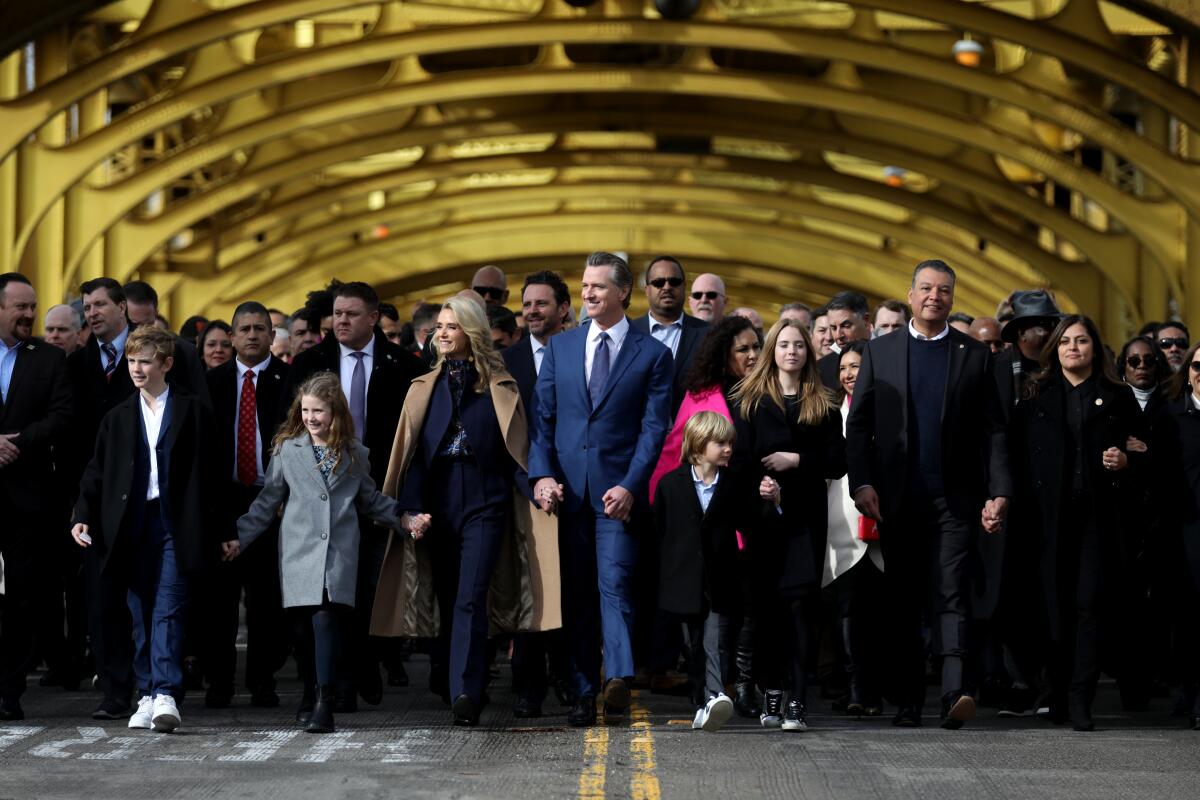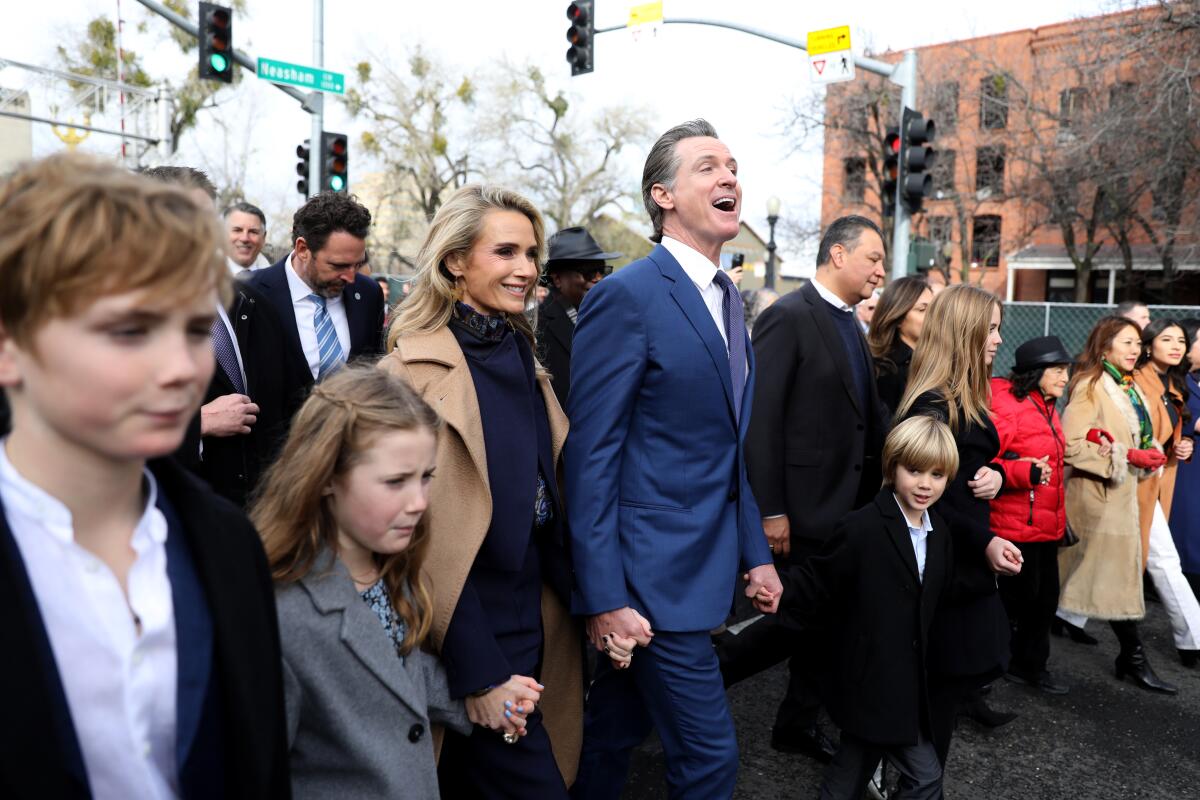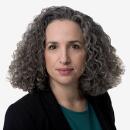Newsom begins second term on anniversary of Jan. 6, casting California as a contrast

- Share via
SACRAMENTO — Gov. Gavin Newsom celebrated the start of his second term Friday on the second anniversary of the attack on the U.S. Capitol, choosing the moment to contrast California’s progressive and inclusive values with what he called the “ugliness that overflowed on Jan. 6.”
Tapping into the symbolism of the day when insurrectionist supporters of President Trump stormed the Capitol in Washington, Newsom drew on his family’s Golden State roots to define diametrical visions of America in his inaugural address delivered under cloudy skies near the steps of the California statehouse.
“I hear the echoes of my own family’s story in those that are still coming to California to pursue their dreams, drawn by the myth and magic of this place,” Newsom said. “Whether your family came here for work, or safety, California offered freedom to access it, not contingent on you looking a certain way, talking a certain way, thinking a certain way. And that’s what makes this place so special.”

Newsom acknowledged the scars of the state’s past, such as Japanese incarceration during World War II and the 1994 ballot measure Proposition 187 to block public services to people who were in the country illegally, and said California continues to try to get it “right for the next generation.”
“And yet, there are still forces, it’s pretty clear, still forces in America that want to take this nation backward,” Newsom said.
The intentional timing of his inauguration on Jan. 6 continues the 55-year-old’s quest for national acclaim as a Democratic leader in the increasingly divisive culture wars between liberals and conservatives that continue to roil the nation. Newsom has refused to cede the concept of “freedom” as a value claimed by Republicans, arguing that California’s protection of reproductive choice, embrace of diversity and support for LGBTQ rights make it a better example of democracy than the policies in places such as Florida and Texas.
Newsom took swings at Republican leaders in other states who he said “silence speech, fire teachers, kidnap migrants, subjugate women, attack the Special Olympics and even demonize Mickey Mouse.”
But as his own state experiences record homelessness, a housing affordability crisis and rising violent crime, the political theme of his inauguration and his decision to connect it to events that transpired more than 2,500 miles away attracted criticism about his priorities and national ambitions.
Gov. Gavin Newsom, drawing a contrast between California’s values and those that fueled the attack on the U.S. Capitol exactly two years ago, is sworn in for a second term. Here are scenes from his inauguration in Sacramento.
“The inauguration indicates, for better or for worse, that his focus is going to continue to try to be on national politics,” said Rob Stutzman, a Republican political consultant who worked for former Gov. Arnold Schwarzenegger.
Newsom has said his second term will be about implementing the major policies he signed into law during his first four years in office, such as the expansion of Medi-Cal eligibility to all immigrants and CARE Court for residents who have mental illness and drug addiction, knowing that Californians now expect to see results.
After leading the state through a global pandemic and defeating a recall election, Newsom already is bracing for new challenges in his second term.
The Legislative Analyst’s Office, which offers policy and fiscal advice to the state Legislature, anticipates the economic good fortune that buoyed California’s recovery from the Great Recession to come to an end with a $24-billion budget deficit in 2023-24. The financial outlook for the state could grow worse in the years ahead depending on how hard the U.S. economy tumbles.
The shift from budgetary excess to shortage threatens to create friction between the governor and Democratic Legislature, who will probably have to delay and cut funding to programs they approved in better economic times. Newsom is expected to unveil his initial budget proposal for the next fiscal year on Tuesday.
“He’s going to have to make very difficult choices at a time when he has had a number of ambitious plans,” said Katie Merrill, a Democratic political strategist.
Assembly Republican leader James Gallagher of Yuba City implored Newsom to change course in his second term and focus on the pressing issues facing the state, including a water crisis and the high cost of living. He warned California’s problems will only get worse in a budget crisis.
“Texas and Florida are doing just fine on their own, and welcoming more Californians escaping our problems each day,” Gallagher said.
Newsom took the oath of office on Monday in a private ceremony. He began his inaugural celebration Friday morning with a march along Capitol Mall in downtown Sacramento before delivering a speech at the state Capitol, and is expected to hold a private reception at the governor’s mansion later in the day.
A handful of protesters were scattered outside the security perimeter that was set up for the march. Anne Wolfley of Modesto held a sign that she said spoke to her anger over the difference between the impacts of the governor’s policies on millions of California public school children, whose schools were closed during the pandemic, and his own children, who attended in-person private school.
“This sign is about Gavin Newsom’s hypocrisy,” Wolfley said.
Holding hands with his wife, Jennifer Siebel Newsom, and son Dutch, the governor and his family began the inaugural event walking next to U.S. Sen. Alex Padilla and Lt. Gov. Eleni Kounalakis in a parade made up of several hundred supporters, largely representatives of labor unions and other liberal constituencies.
Newsom’s children led the Pledge of Allegiance before his wife read a poem in Spanish and sprinkles of English that she described as “a lyrical celebration of the remarkable heart, spirit and soul of the great people of this state.”
In his first inaugural address in 2019, Newsom made sweeping promises to achieve equity in healthcare, pay, education, housing and criminal justice and to partner with local governments to fix the state’s most pressing problems. Four years later, with many of those problems left unsolved, Newsom’s speech on Friday took a more measured tone.
“When you’re coming in the first time you’re not responsible for anything that you’re inheriting,” said Miriam Pawel, a historian and author of “The Browns of California: The Family Dynasty that Transformed a State and Shaped a Nation.” “You’re inheriting a situation that is not of your own making, and you’re speaking to what your plans and aspirations are going forward, without having any responsibility for what’s happened in the past. Then the second time around, there is a balance between looking forward in terms of what you want to do and then also sort of taking note of the past.”
Newsom touted California’s status as the fourth largest economy in the world, its place “leading the world in the transition to a low-carbon green growth future,” policies to offer free community college and the creation of what he called the largest volunteer corps in America.
Former Gov. Gray Davis said Newsom recently visited him at his home in Los Angeles to discuss his second term. He applauded Newsom for sticking up for liberal values on national issues such as immigration and said it won’t detract from the governor’s ability to lead the state.
“It’s clear to me he’s focused on serving four years here. But he’s not going to sit back and watch people exploit or take advantage of migrants or other vulnerable people,” said Davis, who traveled to Sacramento for the inauguration.
Newsom’s address was laced with references to his family’s history and the challenges he faced in his personal life, a departure from past speeches. As a child of divorce and dyslexia, he talked about “the two very different lives” of his mother, who worked multiple jobs to care for him and his sister, and his father, a judge with deep ties to the affluent heirs of the Getty Oil family fortune.
“I couldn’t read, and I was looking for any way to ditch classes,” Newsom said of his 10- or 11-year-old self. “I’d fake stomachaches and dizziness. I’d bite down on the thermometer in the nurse’s office trying to make the temperature rise past 100. Didn’t work.”
Newsom told a story about his father, the late William Newsom, picking him up from school and taking him to San Francisco’s Chinatown for lunch, giving the governor an appreciation for the state’s melting pot of cultures from a young age.
“But what I didn’t understand back then, it was also his mission to give me a slice of San Francisco, our place, and the story of California,” he said.
Merrill said there’s no denying that Newsom is laying the groundwork for national office as he embarks on his final term as chief executive of California. As examples, she pointed to his decision to take on national issues, sparring with conservative states over abortion rights and talking about his more progressive vision for the state and the country. She also noted his choice to speak more openly about his past.
“What’s the first thing you need to do when you’re running for president or thinking about it? You tell your story,” Merrill said. “People need to know you from the very beginning. And he’s actually never been very good at telling his story.”
Newsom has said the public image of him as the slick politician born into San Francisco affluence frustrates him, but he has argued that there’s no point to try to dislodge a perception people have had of him for decades. That has started to change. The former mayor of San Francisco recently opened up about his struggles with dyslexia while promoting a children’s book he wrote last year about a baseball-loving young boy who is deeply embarrassed by his learning issue.
The governor previously detailed the painstaking efforts he continues to make to prepare for speaking engagements and how that preparation helps him overcome his dyslexia.
Newsom’s candor about his issues with self-esteem and feelings of inadequacy into adulthood humanized him and showed a different side to the seemingly polished official.
“That is not who he sees himself as,” said Angie Wei, Newsom’s former legislative affairs secretary and advisor.
“He is not what people think he is. Having a better and more intimate sense of who he is and how that drives his values is a good thing.”
More to Read
Sign up for Essential California
The most important California stories and recommendations in your inbox every morning.
You may occasionally receive promotional content from the Los Angeles Times.














